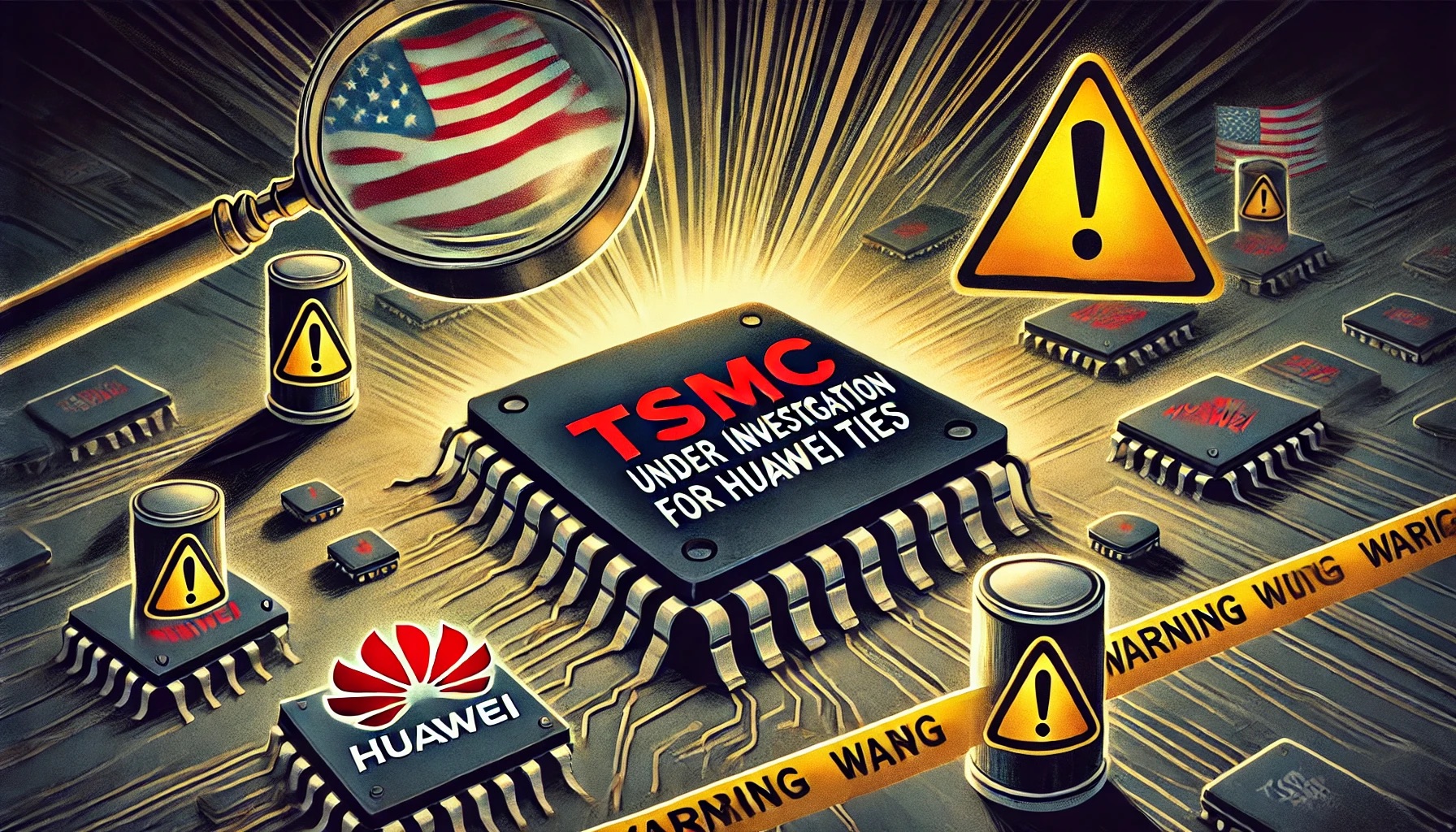Taiwan Semiconductor Manufacturing Company (TSMC) has vowed to take "prompt action" if found violating U.S. sanctions on Huawei, as the Commerce Department investigates alleged chip sales to the Chinese tech giant. TSMC's response underscores its commitment to compliance amid heightened regulatory scrutiny of semiconductor exports.
TSMC Responds to U.S. Investigation Over Alleged Huawei Chip Sales, Reaffirms Compliance with Sanctions
Following reports that the U.S. Commerce Department is investigating Taiwan Semiconductor Manufacturing Company (TSMC) for alleged connections to Huawei, the company has reaffirmed its dedication to adhering to all regulations prohibiting it from selling chips to the Chinese tech behemoth. TSMC's statement was issued in response to a report that suggested the company was being investigated for the potential supply of processors to Huawei for smartphones or artificial intelligence systems. Huawei is prohibited from acquiring high-end chips manufactured using U.S.-origin technologies under U.S. law.
The investigation, which the U.S. Commerce Department purportedly conducts, is being undertaken in the context of increased scrutiny of Huawei's operations, which was imposed by U.S. sanctions in 2020. According to Wccftech, these sanctions prohibited Huawei from procuring advanced products from companies such as TSMC. Due to these restrictions, TSMC cannot sell processors manufactured using 7-nanometer or lower process technology to Huawei, which has resulted in a substantial competitive disadvantage. This is because Apple and its competitors now employ 3-nanometer chips in their devices.
The increasing significance of artificial intelligence has further heightened the global focus on advanced semiconductor shipments. Additionally, companies like NVIDIA are subject to U.S. restrictions on specific sales to Huawei. As a result of this circumstance, China has been motivated to enhance its domestic AI ecosystem to reduce its dependence on Western technology.
TSMC Reaffirms Commitment to Compliance Amid U.S. Scrutiny, Cites Potential Impact on Global Chip Supply
In its statement, TSMC underscored its unwavering commitment to adhering to all regulations and being "a law-abiding company." The company stated that it is committed to compliance and will "take prompt action" in case of any issues. This strong commitment to adherence to regulations is not only imperative for TSMC but also serves as a reassurance to the industry and investors about the company's integrity and dedication to ethical business practices. The demand for AI processors is instrumental in its recovery from a slowdown in the consumer electronics sector.
Given TSMC's dominance in chip production, any violations of U.S. law could have substantial consequences for the global semiconductor industry. Regulatory issues may restrict the company's access to sophisticated manufacturing equipment, necessitating firms to consider diversifying their chip manufacturing supply chains. TSMC's substantial presence in Taiwan, a region embroiled in geopolitical tensions with China, has also contributed to concerns regarding supply chain disruptions.
Jensen Huang, the CEO of NVIDIA, recently stated that the company has implemented operational flexibility to divert from TSMC if necessary. He clarified that NVIDIA incorporates "diversity and redundancy into every aspect wherever possible," guaranteeing that the organization has sufficient intellectual property to relocate its manufacturing operations to an alternative foundry in the event of a need.



 Trump Pushes Tech Giants to Build Power Plants to Offset AI Data Center Energy Costs
Trump Pushes Tech Giants to Build Power Plants to Offset AI Data Center Energy Costs  Anthropic Refuses Pentagon Request to Remove AI Safeguards Amid Defense Contract Dispute
Anthropic Refuses Pentagon Request to Remove AI Safeguards Amid Defense Contract Dispute  Apple to Begin Mac Mini Production in Texas Amid $600 Billion U.S. Investment Plan
Apple to Begin Mac Mini Production in Texas Amid $600 Billion U.S. Investment Plan  Hyundai Motor Plans Multibillion-Dollar Investment in Robotics, AI and Hydrogen in South Korea
Hyundai Motor Plans Multibillion-Dollar Investment in Robotics, AI and Hydrogen in South Korea  OpenAI Pentagon AI Contract Adds Safeguards Amid Anthropic Dispute
OpenAI Pentagon AI Contract Adds Safeguards Amid Anthropic Dispute  Meta Signs Multi-Billion Dollar AI Chip Deal With Google to Power Next-Gen AI Models
Meta Signs Multi-Billion Dollar AI Chip Deal With Google to Power Next-Gen AI Models  Trump Orders Federal Agencies to Halt Use of Anthropic AI Technology
Trump Orders Federal Agencies to Halt Use of Anthropic AI Technology  Pentagon Weighs Supply Chain Risk Designation for Anthropic Over Claude AI Use
Pentagon Weighs Supply Chain Risk Designation for Anthropic Over Claude AI Use  Australia Targets AI Platforms With Strict Age Verification Rules
Australia Targets AI Platforms With Strict Age Verification Rules  Nvidia Earnings Beat Expectations as AI Demand Surges, Stock Rises on Strong Revenue Outlook
Nvidia Earnings Beat Expectations as AI Demand Surges, Stock Rises on Strong Revenue Outlook  AI is already creeping into election campaigns. NZ’s rules aren’t ready
AI is already creeping into election campaigns. NZ’s rules aren’t ready  Synopsys Q2 Revenue Forecast Misses Expectations Amid China Export Curbs and AI Shift
Synopsys Q2 Revenue Forecast Misses Expectations Amid China Export Curbs and AI Shift  OpenAI Secures $110 Billion Funding Round at $840 Billion Valuation Ahead of IPO
OpenAI Secures $110 Billion Funding Round at $840 Billion Valuation Ahead of IPO 































